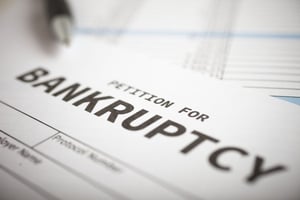
Judging by what you see and hear in the media, it's not uncommon to hear about businesses filing for bankruptcy. Some of these businesses go on to success in life after bankruptcy. And these aren’t just huge, national corporations - according to the Small Business Administration, roughly 80 percent of small businesses will fail. If you’re a sole proprietor whose business is facing insurmountable debt, you may be wondering whether bankruptcy is a viable option for you.
Sole Proprietors Face Unique Challenges
As a sole proprietor, you are intimately familiar with the challenges of starting and running your own business. Unlike major corporations, you probably financed your business from your personal savings or with family loans. You may have even taken out a personal loan in your own name. While corporate entities provide certain advantages, the ease and simplicity of getting started may explain why more than 86 percent of small businesses are sole proprietorships.
You may not even realize that you are a sole proprietorship - you had a skill or product to sell, and you decided to start working at it to generate an income. It’s important to understand that what makes sole proprietorships unique is that they are not a separate, legally-recognized entity like a corporation or LLC. This distinction is crucial to understand if you’re considering filing for bankruptcy.
Chapter 11 Bankruptcy is not an Option for Sole Proprietors
The news media regularly reports on large corporate bankruptcies. Without exception, large corporations file for Chapter 11 bankruptcy, which is a special form of bankruptcy available to legally-recognized corporate entities. This form of bankruptcy allows corporations to restructure their debt and reorganize their business in order to survive. While the outcome might sound attractive, the Chapter 11 bankruptcy process is time-consuming and expensive. For small business owners, Chapter 11, in most cases, is not cost effective.
You Should Consider Consumer Bankruptcy
Because your business is not separate from your personal finances, creditors can sue you personally or take other legal action to collect on your business debts. Even if your debts are primarily related to your business, you can still qualify for consumer bankruptcy in order to get financial relief.
Chapter 7 Bankruptcy for Sole Proprietors
Filing for Chapter 7 bankruptcy is a strong option for sole proprietors who don’t see any successful future for their business. Chapter 7 bankruptcy will allow you to quickly wind down your business and get relief from your creditors. Here are some of the key advantages of Chapter 7 bankruptcy for business owners:
- The typical Chapter 7 bankruptcy case lasts only four to six months, reducing the financial cost and investment of time in the case.
- You do not have to repay any debts that are discharged in your bankruptcy case, so you will not be burdened with debt from a business you no longer operate.
- Much of your personal property (not related to your business) may be considered exempt, and therefore unable to be attached by creditors.
Keep in mind that Chapter 7 will probably require you to sell or otherwise surrender most of the property you accumulated as part of the business in order to satisfy your debts.
In addition, you may have to pass a “means test” in order to qualify for Chapter 7 bankruptcy. The means test determines your disposable income in relation to the average income for a household in your state and of the same size. If your disposable income is higher than the median income, and means test deductions do not reduce your disposable income, you may be disqualified from filing for Chapter 7. There’s an exception to having to fill out the means test, though: if your debt is primarily “non-consumer” debt – that is, if 51% of your debt (or more) is business-related, you do not have to fill out the means test and chapter 7 is available to you, even if you have above-median income.
Chapter 13 Bankruptcy for Sole Proprietors
Chapter 13 is an attractive option if you think your business can continue, but you need to restructure your obligations and debts. Chapter 13 bankruptcy is essentially a court-approved payment plan that you negotiate to repay your creditors. Unlike Chapter 7, a Chapter 13 case can take up to five years to conclude. You can continue to run your business while the bankruptcy case is pending, but you may need to seek the court’s approval before any major transactions such as taking a loan. This can make it difficult to run your business, and increase your operating costs. However, you may be able to retain your assets, get relief from crippling debt, and position your business for future success.
Contact a Minnesota Bankruptcy Attorney to Learn More
As a business owner, you understand the importance of making the right decision at the right time. You also appreciate the value of expertise. The attorneys at Kain & Scott have decades of experience in helping sole proprietors throughout Minnesota find the best path forward when their business is struggling. If you would like to schedule a free consultation with one of our bankruptcy attorneys, just give us a call at 800-551-3292 or send us an email.


